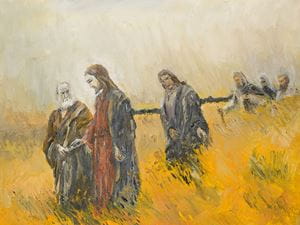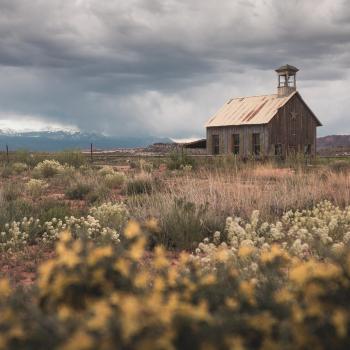
"The Lord is my shepherd; I shall not want." These words are the first scripture many young children experience. City children may have encountered shepherds only in Christmas carols or pictures: kind, peaceful guardians looking after sheep in a field full of angels. In some a sheep is taken to welcome baby Jesus. We didn't realize that a 23rd Psalm sheep had a holy shepherd for life.
In reality, life can be challenging and dangerous for sheep. Psalm 23 blends images of peaceful pastures, threatening shadows, and restorative opportunities, as our "Good Shepherd" guides us, protects us, teaches us, and helps us stay safe. Children learn to trust Jesus, with an image they can carry throughout their lives. And many persons of all ages recite the Psalm as they realize they are approaching a new pasture.
Henry Ward Beacher, widely known and respected as a clergyman, statesman, and reformer during the U.S. Civil War, wrote that Psalm 23 "has charmed more griefs to rest than all the philosophies of the world."
A Personal Shepherd
Christ assured, “I am the good shepherd, and know my sheep . . . And [will] lay down my life for the sheep” (John 10:14-15). One of the blessings of Psalm 23 is that it portrays a personal relationship, not an abstract shepherd to be worshipped from afar. As Isaiah had prophesied (40:11), "He shall feed his flock like a shepherd: he shall gather the lambs with his arm, and carry them in his bosom, and shall gently lead those that are with young." Sensitive. Caring.
Christ assured, “I am the good shepherd, and know my sheep . . . And [will] lay down my life for the sheep” (John 10:14-15). One of the blessings of Psalm 23 is that it portrays a personal relationship, not an abstract shepherd to be worshipped from afar. As Isaiah had prophesied (40:11), "He shall feed his flock like a shepherd: he shall gather the lambs with his arm, and carry them in his bosom, and shall gently lead those that are with young." Sensitive. Caring.
"He maketh me to lie down in green pastures: he leadeth me beside the still waters" the psalm assures. The shepherd knows how to bring peace and comfort to His sheep—and He does it. Joseph Addison (1672-1719) expressed this in a moving hymn Christians still sing today.
The Lord my pasture shall prepare,
And feed me with a shepherd's care; His presence shall my wants supply,
And guard me with a watchful eye; My noonday walks he shall attend,
And all my midnight hours defend.
A Guiding Shepherd
The psalm becomes more serious. "He restoreth my soul: he leadeth me in the paths of righteousness for his name's sake." Souls as well as physical bodies have needs of a shepherd for life. An article on Inspiredscripture.com put this in perspective.
A life without struggle is something promised only in heaven. Jesus nevertheless offers peace during your struggles. He offers a peace that is not like the peace that the world offers . . . He instead promises something better. He promises the peace that surpasses worldly understanding: “And the peace of God, which surpasses all comprehension, will guard your hearts and minds in Christ Jesus” (Phil. 4:7). He helps you to find inner peace, even during the worst of trials.
The same verse tells us how this can happen. Even in green pastures, different paths will be available. The Good Shepherd leads his sheep to the paths "of righteousness"; Christian authors seem to agree that these are moral laws. The Shepherd doesn't drive the sheep or otherwise force them. Each must make the decision to follow Him or wander in another direction.
Garret W. Gong, an international scholar, leader, and writer, clarified, "As our Good Shepherd, Jesus Christ calls us in His voice and His name." So Psalm 23 adds "for His name's sake" to the path guidance. Some writers consider this a claim of glory or credit; others consider it recognition or responsibility.
A Protecting Shepherd
The sheep cannot be confined within a single pasture. They must "walk through the valley of the shadow of death." As an earthly shepherd, the psalmist, David, had killed wild animals threatening his sheep (including Goliath perhaps). By themselves, sheep have little defense against predators or protection from dangers in the environment or circumstances in which they find themselves.
On the website renew.org, Joshua Branham declared, "The valley of the shadow of death is a place of scarcity, danger, pain, and the unknown. This is uncharted charity for the sheep." However, he added, " but not for the shepherd. We can be encouraged knowing that God uses the valley to strengthen our faith and draw us closer to him." Branham concluded: "Take heart; Jesus knows where he is going"—concluding, "While Jesus doesn’t spare us from the valley, he doesn’t leave us there either."
On the website renew.org, Joshua Branham declared, "The valley of the shadow of death is a place of scarcity, danger, pain, and the unknown. This is uncharted charity for the sheep." However, he added, " but not for the shepherd. We can be encouraged knowing that God uses the valley to strengthen our faith and draw us closer to him." Branham concluded: "Take heart; Jesus knows where he is going"—concluding, "While Jesus doesn’t spare us from the valley, he doesn’t leave us there either."
We may trust our shepherd for life: "I will fear no evil: for thou art with me; thy rod and thy staff they comfort me." The shepherd may allow a little bumping and stumbling—as sheep are prone to do—but sheep who stay close the to shepherd are not threatened by evil.
The shepherd carries both a rod and a staff. A rod could be used to defend, control, or discipline the sheep. The staff, ending in a hook, could grip a sheep around its chest to manipulate it into or out of a place where it should or shouldn't be. Those kinds of support would be a real "comfort"—particularly in a place full of shadows.
Symbols and Assurances
"Thou preparest a table before me in the presence of mine enemies: thou anointest my head with oil; my cup runneth over." Some of us who learned Psalm 23 as children were a little puzzled by the enemies present at the table prepared by the shepherd. Those writing professionally about the psalm do not agree about these intruders either. Identifications range from those defeated in battle and forced to stand there to the presence of Satan himself.
We know from nearby symbols and images that the prepared table is a blessed and loving occasion. "Thou anointest my head with oil; my cup runneth over." The website Inspired Scripture.com explained that In the Old Testament culture when the psalm was written, anointing with oil represented the Holy Spirit (1 Sam. 16:13), bringing "God's joy" and His healing.
A cup is a convenient and versatile symbol. A useful site, biblegateway.com, noted that Shepherds gave water to their sheep in a very large cup, which may be the cup mentioned. Some Christians prefer to interpret the cup as referring to the generosity of the shepherd who provided the table.
Goodness and Mercy
Psalm 23 ends with the ultimate promise of comfort, love, and security: "Surely goodness and mercy shall follow me all the days of my life: and I will dwell in the house of the Lord for ever." The words "follow me" may be very important. In biblical times, all the sheep followed their shepherd—until one of them didn't. Whether because of circumstances or the sheep's wandering agency, likely about one per hundred might be lost.
Ninety-nine per hundred safe might be satisfactory for some; but not for the Good Shepherd, with his infinite goodness and mercy. As our shepherd for life, He follows a lost sheep until He finds it. A worldwide Christian leader, speaker, and writer, Dieter F. Uchtdorf, explained, "The sheep is worthy of divine rescue simply because it is loved by the Good Shepherd."
Like the Lord and the psalmist intended, Uchtdorf extended the meaning to God's relationship with all His people.
The Good Shepherd knows and loves us . . . He knows when you are lost, and He knows where you are . . . What matters is that you are His child. And He loves you. He loves His children.
Because He loves you, He will find you. He will place you upon His shoulders, rejoicing. And when He brings you home, He will say to one and all, “Rejoice with me; for I have found my sheep which was lost.”
No matter how troublesome the search and rescue might have been, the Good Shepherd doesn't drive or drag the sheep back with Him. As its shepherd for life, He lays it tenderly on His shoulders and carries it. That sheep isn't a 99-to-1 statistic; it is a loved one worthy of His infinite goodness and mercy. He joyfully brings it home to His fold—where it belongs. "Goodness and mercy" doesn't promise ease and luxury; what it promises is far more important.
Juan A. Uceda, a Christian leader and educator from Peru, mentioned that in the Greek translation of the 23rd Psalm, the word used for "good" also means "beautiful" and "magnificent." He noted that in addition to "the Good Shepherd," the New Testament salutes Him as "the Great Shepherd " (Hebrews 13:20), "the Chief Shepherd" (1st Peter 5:4), and "the Shepherd and Bishop of Souls" (1 Peter 2:25). We join Uceda in our reverence for "the Good Shepherd, the Beautiful Shepherd, the Magnificent Shepherd" who laid down His life for His sheep.
4/17/2024 9:49:46 PM




